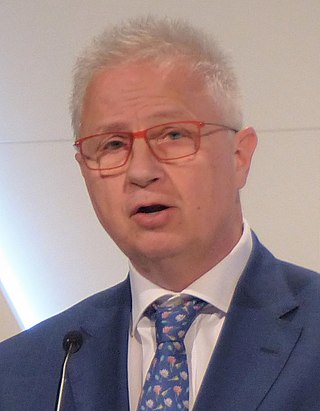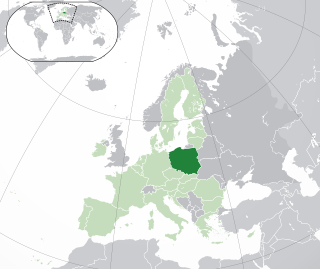| |||||
| Decades: | |||||
|---|---|---|---|---|---|
| See also: | |||||
Events from 2021 in the European Union.
| |||||
| Decades: | |||||
|---|---|---|---|---|---|
| See also: | |||||
Events from 2021 in the European Union.

The European People's Party Group is a political group of the European Parliament consisting of deputies (MEPs) from the member parties of the European People's Party (EPP). Sometimes it also includes independent MEPs and/or deputies from unaffiliated national parties. The EPP Group comprises politicians of Christian democratic, conservative and liberal-conservative orientation.

Fidesz – Hungarian Civic Alliance is a right-wing populist and national-conservative political party in Hungary led by Viktor Orbán.

The European People's Party (EPP) is a European political party with Christian democratic, liberal-conservative, and conservative member parties. A transnational organisation, it is composed of other political parties. Founded by primarily Christian-democratic parties in 1976, it has since broadened its membership to include liberal-conservative parties and parties with other centre-right political perspectives. On 31 May 2022, the party elected as its President Manfred Weber, who was also EPP's Spitzenkandidat in 2019.

Viktor Mihály Orbán is a Hungarian lawyer and politician who has been Prime Minister of Hungary since 2010, previously holding the office from 1998 to 2002. He led the Fidesz political party from 1993-2000 and since 2003.

Manfred Weber is a German politician who has been serving as President of the European People's Party (EPP) since 2022 and as Leader of the EPP Group in the European Parliament since 2014. He has been a Member of the European Parliament (MEP) from Germany since 2004. He is a member of the Christian Social Union (CSU), part of the European People's Party.

József Szájer is a retired Hungarian politician and former Member of the European Parliament (MEP) of the Fidesz party. He resigned as MEP on 29 November 2020 after having been caught by Belgian police after a gay sex orgy on the night of 27 November, in violation of local COVID-19 regulations.

Beata Maria Szydło is a Polish politician who has served as a Member of the European Parliament (MEP) since 2019. A member of Law and Justice (PiS), she previously served as the prime minister of Poland from 2015 to 2017. Szydło became the third woman to hold the office, after Hanna Suchocka and her immediate predecessor Ewa Kopacz. She currently is a vice-chair of the European Conservatives and Reformists (ECR) group in the European Parliament. She is considered to have been a de iure leader of Poland, with the de facto leader being Jarosław Kaczyński, the leader of the party Szydło is a member of.

Hungary–Russia relations are the bilateral foreign relations between the two countries, Hungary and Russia. Hungary has an embassy in Moscow and two consulate-generals. Russia has an embassy in Budapest and a consulate-general in Debrecen. Both countries are full members of the Organization for Security and Co-operation in Europe.

The second government of Viktor Orbán or the Government of National Cooperation was the Government of Hungary from 29 May 2010 to 6 June 2014. Orbán formed his second cabinet after his party, Fidesz won the outright majority in the first round on April 11, with the Fidesz-KDNP alliance winning 206 seats, including 119 individual seats. In the final result, they won 263 seats, of which 173 are individual seats. Fidesz held 227 of these seats, giving it an outright majority in the National Assembly by itself.

The third government of Viktor Orbán was the Government of Hungary between 6 June 2014 and 18 May 2018. Prime Minister Viktor Orbán formed his third cabinet after his party-alliance, Fidesz and its coalition partner, Christian Democratic People's Party (KDNP) altogether won a qualified majority in the 2014 parliamentary election.

Patriots.eu, formerly known as the Identity and Democracy Party (ID) and the Movement for a Europe of Nations and Freedom (MENF), is a nationalist, right-wing populist and Eurosceptic European political party founded in 2014. Its Members of the European Parliament sat in the Europe of Nations and Freedom group from 2015 to 2019, then in the Identity and Democracy group between 2019 and 2024; following the 2024 European Parliament election, most of its MEPs sit with the Patriots for Europe group.

Parliamentary elections were held in Hungary on 3 April 2022 to elect the National Assembly, coinciding with a referendum. Hungary's incumbent prime minister Viktor Orbán won re-election to a fourth term. Addressing his supporters after the partial results showed Fidesz leading by a wide margin, Orbán said: "We won a victory so big that you can see it from the moon, and you can certainly see it from Brussels." Opposition leader Péter Márki-Zay admitted defeat shortly after Orbán's speech. Reuters described it as a "crushing victory".

An election of Members of the European Parliament from Hungary to the European Parliament was held on 26 May 2019, electing the 21 members of the Hungary delegation to the European Parliament as part of the European elections held across the European Union.

A Polish withdrawal from the European Union, or Polexit, is the name given to a hypothetical Polish withdrawal from the European Union. The term was coined after Brexit, the process of Britain's withdrawal from the EU which took place between 2016 and 2020. Opinion polls held in the country, between 2016 and 2021, indicated majority support for continued membership of the European Union (EU). A 2022 survey indicated that "[at] least eight-in-ten adults in Poland" believed that the EU "promotes peace, democratic values and prosperity". The 2023 Polish parliamentary election was won by a coalition of predominantly pro-EU parties.
This is a timeline of the relations between Hungary and the European Union (EU), since the transition in Hungary in 1989-90.
Events in the year 2021 in Hungary.

A referendum was held in Hungary on 3 April 2022, coinciding with the parliamentary elections. While the overwhelming majority of valid votes were cast as "no" to the four referendum questions, the share of valid votes was below the 50% required for the result to be considered valid.
The Hungarian conservative party Fidesz has been accused of exhibiting anti-democratic and authoritarian tendencies since their return to leading the Hungarian government in 2010 under the leadership of Viktor Orbán in his second premiership. The Fidesz-led government has been accused of severely restricting media freedom, undermining the independence of the courts, subjugating and politicising independent and non-governmental institutions, surveilling political opponents, engaging in electoral engineering, and assailing critical NGOs. The Fidesz-led government has been accused of engaging in cronyism and corruption. Fidesz has been accused of antisemitism, and the Fidesz-led government has been accused of passing legislation that violates the rights of LGBT persons. Due to its controversial actions, Fidesz and its government have come in conflict with the EU on multiple occasions.
Events in the year 2024 in Hungary.

Patriots for Europe is a right-wing to far-right sovereigntist political group, formed as the third-largest group ahead of the tenth European Parliament.